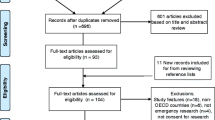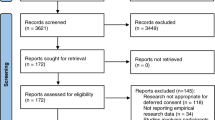Abstract
Setting reasonable and fair limits of emergency research acceptability in ethical norms and legal regulations must still adhere to the premise of well-being of the research subject over the interests of science and society. Informed consent of emergency patients to be enrolled in clinical trials is a particularly difficult issue due to impaired competencies of patients’ to give consent, short diagnostic and therapeutic windows, as well as the requirement to provide detailed information to participants. Whereas the Declaration of Helsinki, Good Clinical Practice guideline, Additional Protocol to the European Bioethical Convention concerning Biomedical Research, as well as appropriate regulations adopted by the Food and Drugs Administration (USA) allow waivers from participants’ consent or deferred consent for emergency research, the regulations of most European Community countries following the Clinical Trial Directive (2001/20/EC) do not give space for a deferred consent or a waiver from consent for adult patients (unless surrogate consent is made use of). This is even more confusing in case of Poland, where conflicting regulations on a waiver from a participant’s consent in emergency research exist and the regulations on surrogate consent of temporarily incompetent adults are too restrictive and authorise only the guardianship courts to consent, which is not or hardly feasible in practice. European Community regulations need to be amended to allow for implementation of the deferred consent or waivers from consent for emergency research in order to enable ethical research of emergency conditions that should become a large part of important public health priorities.
Similar content being viewed by others
References
Guideline for Good Clinical Practice. (1996). International Conference on Harmonisation, Topic E6, http://www.emea.europa.eu
World Medical Association Declaration of Helsinki. (1964). Adopted by the 18th WMA General Assembly, Helsinki, Finland, last amended in 2004, http://www.wma.net
Convention for the protection of human rights and dignity of the human being with regard to the application of biology and medicine: Convention on human rights and biomedicine. Council of Europe, http://www.conventions.coe.int
Additional Protocol to the Convention on Human Rights and Biomedicine, concerning Biomedical Research. Council of Europe, http://www.conventions.coe.int
Agard, A., Herlitz, J., & Hermeren, G. (2004). Obtaining informed consent from patients in the early phase of acute myocardial infarction: Physicians’ experiences and attitudes. Heart, 90, 208–210.
Smithline, H. A., Mader, T. J., & Crenshaw, B. J. (1999). Do patients with acute medical conditions have the capacity to give informed consent for emergency medicine research? Academic Emergency Medicine, 6, 776–780.
Agard, A., Hermeren, G., & Herlitz, J. (2001). Patients’ experiences of intervention trials on the treatment of myocardial infarction: Is it time to adjust the informed consent procedure to the patient’s capacity? Heart, 86, 632–637.
Williams, B. F., French, J. K., & White, H. D., HERO-2 consent substudy investigators (2003). Informed consent during the clinical emergency of acute myocardial infarction (HERO-2 consent substudy): A prospective observational study. Lancet, 361, 918–922.
Demarquay, G., Derex, L., Nighoghossian, N., Adeleine, P., Philippeau, F., Honnorat, J., & Trouillas, P. (2005). Ethical issues of informed consent in acute stroke. Analysis of the modalities of consent in 56 patients enrolled in urgent therapeutic trials. Cerebrovascular Diseases, 19, 65–68.
Gammelgaard, A., Mortensen, O. S., Rossel, P., DANAMI-2 Investigators (2004). Patients’ perceptions of informed consent in acute myocardial infarction research: A questionnaire based survey of the consent process in the DANAMI-2 trial. Heart, 90, 1124–1128.
Stocchetti, N., Dearden, M., Karimi, A., Lapierre, F., Maas, A., Murray, G. D., Ohman, J., Persson, L., Sahuquillo, J., Servadei, F., Teasdale, G., Trojanowski, T., & Unterberg, A. (2003). New European directive on clinical trials. Lancet, 361, 1473.
Lotjonen, S. (2002). Medical research in clinical emergency settings in Europe. Journal of Medical Ethics, 28, 183–187.
Biros, M. H. (2003). Research without consent: Current status, 2003. Annals of Emergency Medicine, 42, 550–564.
Liddell, K., Chamberlain, D., Menon, D. K., Bion, J., Kompanje, E. J., Lemaire, F., Druml, C., Vrhovac, B., Wiedermann, C. J., & Sterz, F. (2006). The European clinical trials directive revisited: The VISEAR recommendations. Resuscitation, 69, 9–14.
Author information
Authors and Affiliations
Corresponding author
Rights and permissions
About this article
Cite this article
Iwanowski, P.S. Informed Consent Procedure for Clinical Trials in Emergency Settings: The Polish Perspective. Sci Eng Ethics 13, 333–336 (2007). https://doi.org/10.1007/s11948-007-9030-9
Received:
Accepted:
Published:
Issue Date:
DOI: https://doi.org/10.1007/s11948-007-9030-9




